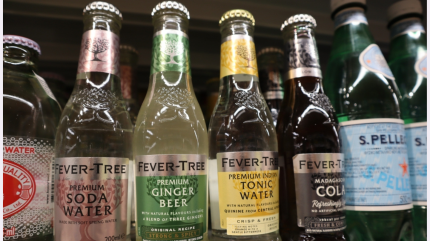
Fever-Tree, the UK mixers supplier, has downgraded its forecast for annual revenues after “poor” weather in Europe and a “subdued consumer” hit first-half dales.
In March, the UK business said it was “comfortable” with the consensus prediction among analysts that annual revenues from the Fever-Tree brand would grow by around 10%.
However, flat revenue from Fever-Tree in the opening six months of 2024 has led the group to lower those expectations. The company said today (12 September) it now expects to see revenue from the Fever-Tree brand rise by 4-5%.
In the six months to the end of June, revenue from Fever-Tree stood at £170.6m, versus £170m a year earlier. Group revenue, which includes that generated by Global Drinks Partnership arm, dropped 2% to £172.9m and was flat on a constant-currency basis.
Fever-Tree pointed to a “subdued consumer backdrop” and lacklustre weather in the second quarter across Europe. However, the group said it had seen “strong” summer trading in July and August when sales from the Fever-Tree brand grew 13%.
“Whilst the first half was challenging, we are controlling the controllables. We have delivered substantial margin improvement, resulting in a c.80% increase in EBITDA year-on-year, as well as driving share gains against the competition across all our regions, demonstrating the growing strength of the Fever-Tree brand,” Fever-Tree CEO Tim Warrillow said.

US Tariffs are shifting - will you react or anticipate?
Don’t let policy changes catch you off guard. Stay proactive with real-time data and expert analysis.
By GlobalData“We’re optimistic of an acceleration of growth across the second half of the year and have seen a much more positive trading performance in July and August.”
First-half gross profit increased 15% to £62m. Adjusted EBITDA was £18.2m, up 79%. Profit for the period stood at £7.6m, compared to £1.1m a year earlier.
Fever-Tree has focused on building it portfolio of non-tonic products in the UK, which increased sales value by 10% in the opening six months of its financial year.
The business noted non-tonic products accounted for 40% of its global revenue, products such as its ginger beer, “adult” soft-drinks and cocktail mixers.
In the US, Fever-Tree cited “strong growth” in the on-trade as it increased the number of accounts and the amount of products with each customer. On-trade distribution points increased by 16% year on year, as the beverage producer reported “new wins” with Hilton, Marriott Hotels, Soho House and STK Steakhouse.
Fever-Tree’s US sales grew 7% in the first half of the year to £60.3m.
Sales from the company’s Europe arm – which excludes the UK – dropped from £56.1m to £46.8m. Fever-Tree cited “poor” weather and the phasing of distributor orders. The group said its on-trade sales were “particularly impacted” by not just the weather but “low consumer confidence”.
In the group’s home market, UK revenues declined by 6% to £50.9m. Fever-Tree said the UK’s on-trade “remained challenged” as poor weather and a “soft” gin category hit sales.
“Looking further ahead, our continued investment in the brand and focus on innovation in recent years ensures we are better positioned than ever to capitalise on the long-term drink trends, both in terms of continued spirit growth and premiumisation but also as adults continue to seek out a broader range of premium drinks, both with and without alcohol,” Warrillow added.



